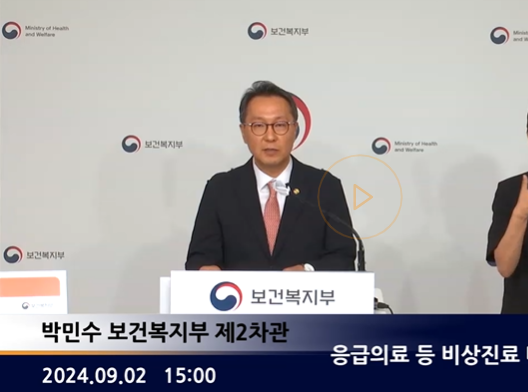As Korea's Chuseok holiday approaches, the nation's emergency medical services are under scrutiny amid fears of a potential medical system collapse.
In a rebuke to recent government reassurances, a group of medical professors at the National Emergency Measures Committee signaled the threat of the state of emergency care in Korea on Monday. They warned that contrary to the government’s announcements, emergency hospitals are unable to provide standard medical services due to a critical shortage of specialists, stating that the nation’s emergency medical system is “teetering on the edge of collapse.”
In response, the government pushed back against these concerns.
Later in the afternoon on Monday, Park Min-soo, the Second Vice Minister of Health and Welfare, said during a press briefing at the Government Complex Sejong that “despite existing challenges, the overall emergency medical capacity is not in imminent danger.”

He dismissed fears of a system breakdown and reassured the public that the government is closely monitoring each facility and will promptly implement necessary medical response measures to manage the situation.
According to the MOHW, of the 409 emergency rooms nationwide, 99 percent are operating around the clock. Though 27 rooms (6.6 percent) have reduced bed capacity, the total number of emergency room beds remains at 97.5 percent of normal levels. The Health Insurance Review and Assessment Service (HIRA) noted a slight increase in emergency medicine specialists, from 1,504 in December to 1,587 in August.
Nonetheless, a recent wave of mass resignations has left the total number of physicians in emergency rooms at just 73.4 percent of the usual number.
Park said that the government is reinforcing staffing through military doctors, public health physicians, additional nurses, and consulting physicians.
“The government is deploying military doctors and additional staff to emergency rooms with limited services starting Wednesday,” he said.
Approximately 235 military and public health doctors will be dispatched to high-risk facilities in a phased approach over the coming week, the government said.
Park said that the reduced capacity—down by 20 to 30 percent—means hospitals are prioritizing the most severe cases. “The prolonged nature of these challenges has led to staggering staff shortages and overwhelmed systems,” he said.
Data from the the National Emergency Medical Center (NEMC) shows a drop in facilities capable of providing follow-up care, from an average of 109 to 102 in late August. Despite claims of severe staffing shortages, Park assured that while there are reductions due to resident shortages, the government is working to maintain adequate staffing levels.
Emergency room visits have surged from an average of 17,892 per day to 19,783 in the third week of August, with a notable increase in mild and non-emergency cases. Although Covid-19-related mild illness cases have decreased, continued public cooperation remains crucial.
The briefing also covered the status of regional emergency centers. As of Monday, Konkuk University Chungju Hospital, Kangwon National University Hospital, and Chungnam National University Sejong Hospital have reduced emergency room hours.
Konkuk University Chungju Hospital, initially at risk of closure, is now limiting operations to nights and weekends. Kangwon National University Hospital and Chungnam National University Sejong Hospital will limit adult and nighttime services but plan to operate normally during Chuseok.
Contrary to some reports, Ajou University Hospital has not suspended its emergency services and continues to operate without interruption, with Gyeonggi Province providing 1 billion won ($747,000) in support.
Related articles
- Medical students on leave of absence join army instead of returning to school
- Surge in ER restriction messages highlights strain on emergency care amid medical staff shortages
- Hospitals worry over temporary holiday on Oct. 1 amid mandatory emergency care
- Korea to secure 5 million doses of Covid-19 vaccine this week
- Health ministry clarifies guidelines on lawful refusal of emergency room treatment
- Undue dependence on government came back as pressure: medical professors

